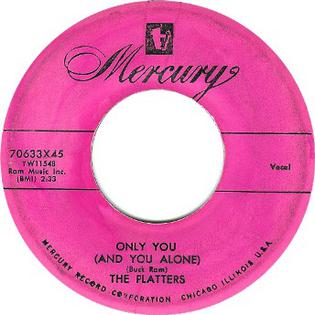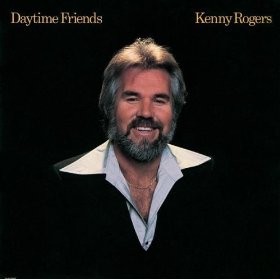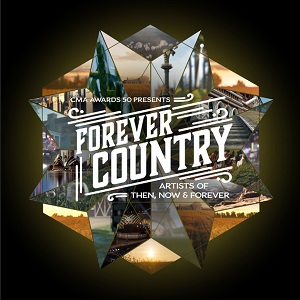
Randy Bruce Traywick, known professionally as Randy Travis, is an American country and gospel music singer and songwriter, as well as a film and television actor. Active since 1979, he has recorded over 20 studio albums and charted over 50 singles on the Billboard Hot Country Songs charts, including sixteen that reached the number-one position.

George Glenn Jones was an American country musician, singer, and songwriter. He achieved international fame for a long list of hit records, and is well known for his distinctive voice and phrasing. For the last two decades of his life, Jones was frequently referred to as "the greatest living country singer", "The Rolls-Royce of Country Music", and had more than 160 chart singles to his name from 1955 until his death in 2013.

"Only You (And You Alone)" (often shortened to "Only You") is a doo wop song composed by Buck Ram, the manager of the Platters, the group that made the song famous in the US, the UK and Belgium. The Platters's lead vocals are by Tony Williams.

"Delta Dawn" is a song written by musician Larry Collins and country songwriter Alex Harvey. The first notable recording of the song was in 1971 by American singer and actress Bette Midler for her debut album The Divine Miss M. However it is best known as a 1972 top ten country hit for Tanya Tucker and a 1973 US number one hit for Helen Reddy.

Always & Forever is the second studio album by American country music singer Randy Travis. It was released on May 4, 1987, by Warner Bros. Records. Released from this album were the singles "Too Gone Too Long", "I Won't Need You Anymore ", "Forever and Ever, Amen" and "I Told You So", all of which reached Number One on the Billboard Hot Country Songs charts.

Myrna Joy "Jody" Miller was an American singer, who had commercial success in the genres of country, folk and pop. She was the second female artist to win a country music accolade from the Grammy Awards, which came off the success of her 1965 song "Queen of the House". By blending multiple genres together, Miller's music was considered influential for other music artists.

The Gospel Collection is the 58th studio album by American country music singer George Jones, released on April 4, 2003 on the Bandit Records label, and the first single, "I Know A Man Who Can" was released through Rick Hendrix Company.

Daytime Friends is the third studio album by American singer Kenny Rogers for United Artists Records, released in 1977. It was his second major success following the break-up of The First Edition in 1976.

Daryle Bruce Singletary was an American country music singer. Between 1995 and 1998, he recorded for Giant Records, for which he released three studio albums, Daryle Singletary (1995), All Because of You (1996), and Ain't It the Truth (1998). In the same timespan, Singletary entered the Top 40 of the Hot Country Songs charts five times, reaching No. 2 with "I Let Her Lie" and "Amen Kind of Love", and No. 4 with "Too Much Fun".

Part II is the second studio album by American country music artist Brad Paisley. Released on May 29, 2001, through Arista Nashville, it became Paisley's second platinum-certified album in the United States. It produced four singles; "Two People Fell in Love", "Wrapped Around", "I'm Gonna Miss Her " and "I Wish You'd Stay", which respectively reached number 4, number 2, number 1, and number 7 on the Billboard Hot Country Singles & Tracks charts. "Too Country" also entered the country charts from unsolicited airplay.

"Forever and Ever, Amen" is a song written by Paul Overstreet and Don Schlitz, and recorded by American country music artist Randy Travis. It was released in March 1987 as the first single from the album Always & Forever and became Travis's third No. 1 single on the U.S. Billboard Hot Country Singles charts.

"I Told You So" is a song written and recorded by American country music singer Randy Travis from his 1987 album, Always & Forever. It reached number one on the U.S. Billboard and Canadian RPM country singles charts in June 1988. Travis had first recorded it on his 1983 album Live at the Nashville Palace under his stage name "Randy Ray". It became a local hit and one of his most requested songs at the club. In 2007, the song was covered by Carrie Underwood on her album Carnival Ride. Her version was released in February 2009 and was re-recorded and re-released in March as a duet with Travis. Underwood's and Travis' duet peaked at number two on the U.S. country charts in 2009.

"Deeper Than the Holler" is a song written by Paul Overstreet and Don Schlitz, and recorded by American country music singer Randy Travis. It was released in November 1988 as the second single from the album, Old 8x10. The song was his eighth Number One single, and his sixth consecutive.
Music and artificial intelligence is the development of music software programs which use AI to generate music. As with applications in other fields, AI in music also simulates mental tasks. A prominent feature is the capability of an AI algorithm to learn based on past data, such as in computer accompaniment technology, wherein the AI is capable of listening to a human performer and performing accompaniment. Artificial intelligence also drives interactive composition technology, wherein a computer composes music in response to a live performance. There are other AI applications in music that cover not only music composition, production, and performance but also how music is marketed and consumed. Several music player programs have also been developed to use voice recognition and natural language processing technology for music voice control. Current research includes the application of AI in music composition, performance, theory and digital sound processing.

I Told You So: The Ultimate Hits of Randy Travis is a compilation album released by country music artist Randy Travis in 2009. It consists of 32 songs overall in a two disc set. Two of the songs were never before released on albums. Travis' numerous number-one hits including "I Told You So", Deeper Than the Holler", "Forever and Ever, Amen" and "Three Wooden Crosses" are included on the album along with duets with country legends Tammy Wynette and George Jones. Travis' cover of Roger Miller's "King of the Road" is also included along with two tracks from his previous studio album Around the Bend.

"T-R-O-U-B-L-E" is a song written by Jerry Chesnut and recorded by Elvis Presley in March 1975. It was released as a single, as the A-side, with the B-side "Mr. Songman", through RCA Victor that was taken from his album Today. It is not to be confused with the Leiber and Stoller song "Trouble", that Presley first recorded in July 1958, and which was subsequently recorded by numerous other artists.

"The Hole" is a song written by Skip Ewing and James Dean Hicks, and recorded by American country music singer Randy Travis. It was released in June 1998 as the second single from his album You and You Alone. It peaked at number 9 on the Hot Country Singles & Tracks chart, and number 4 in Canada.

Randy Travis is an American country music singer. His singles discography comprises 70 singles and 36 music videos.

"Forever Country" is a 2016 mashup performed by Artists of Then, Now & Forever, a one-time gathering of 30 American country music artists. The song combines elements of three previous country hits: John Denver's "Take Me Home, Country Roads" (1971), Willie Nelson's "On the Road Again" (1979), and Dolly Parton's "I Will Always Love You" (1973). The song was recorded to commemorate the Country Music Association Awards reaching its 50th year. Originally, CMA Awards producers had wanted to record a cover of a single song; the idea to instead record a mashup came from Joseph Kahn, who directed the song's music video. The song was recorded in a span of three days in Nashville, Tennessee, in June 2016 with Shane McAnally as producer, with the music video produced concurrently.

Country State of Mind is the eighth studio album by American country music singer Josh Turner. It was released on August 21, 2020, via MCA Nashville.



















